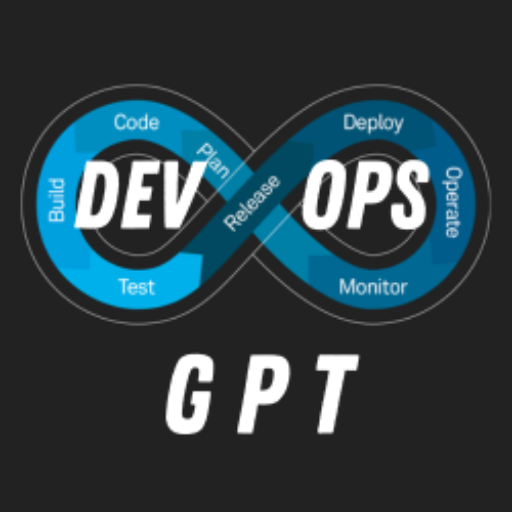DEVSECOPS-integrated DevOps security solutions.
AI-powered DevOps Security Integration.
Aide-moi en programmation
Aide-moi en devops
Aide-moi en cybersécurité
Aide-moi en réseaux informatiques
Aide-moi en systèmes informatiques
Related Tools
Load More
DevOps GPT
DevOps specialist that offers expertise in cloud operations, delivering cost-effective and secure solutions. An expert that excels in solving challenges, providing accurate guidance on Bash, AWS, Terraform, Kubernetes (K8S), Open Source, Helm, Linux Shell

DevOps GPT
AI coding expert for all cloud operation needs. Responds concisely with cost efficient and secure practices.
Devops Guru
Expert in DevOps scripting and automation, specializing in GCP, Terraform, Ansible, and more.

IAC Code Guardian
Introducing IAC Code Guardian: Your Trusted IaC Security Expert in Scanning Opentofu, Terrform, AWS Cloudformation, Pulumi, K8s Yaml & Dockerfile

AI DEVOPS FR
Conseils DevOps, Terraform, Kubernetes, Python, Linux, Cloud, Support en Français

DevOps Engineer
DevOps engineer specializing in automation advice and strategies. The focus of this GPT is the cloud native technologies like Kubernetes, ArgoCD, GitOps methods, GitHub actions, KEDA and others. Read articles on devoriales.com
20.0 / 5 (200 votes)
Introduction to DEVSECOPS
DEVSECOPS, short for Development, Security, and Operations, is an approach that integrates security practices within the DevOps process. Its primary purpose is to ensure that security is an integral part of the software development lifecycle, rather than an afterthought. This methodology aims to deliver secure software faster by promoting collaboration between development, security, and operations teams. A typical scenario illustrating DEVSECOPS would be a continuous integration/continuous deployment (CI/CD) pipeline where automated security checks are embedded at each stage, from code commits to production deployment. This ensures that vulnerabilities are detected and addressed early, reducing the risk of security breaches.

Main Functions of DEVSECOPS
Automated Security Testing
Example
Integrating static application security testing (SAST) tools in the CI/CD pipeline.
Scenario
During the build process, the SAST tool automatically scans the source code for vulnerabilities, providing immediate feedback to developers. This enables the team to fix security issues before the code progresses to the next stage.
Continuous Monitoring
Example
Implementing runtime application self-protection (RASP) solutions.
Scenario
In a production environment, RASP tools monitor applications in real-time, detecting and blocking suspicious activities. This helps in identifying and mitigating threats dynamically, ensuring ongoing security compliance.
Infrastructure as Code (IaC) Security
Example
Using tools like Terraform or AWS CloudFormation with integrated security checks.
Scenario
When defining infrastructure through code, these tools can include security policies that automatically validate configurations against best practices. For instance, ensuring that no S3 buckets are publicly accessible unless explicitly required.
Ideal Users of DEVSECOPS Services
Development Teams
Development teams benefit from DEVSECOPS by integrating security into their workflows, reducing the likelihood of discovering critical vulnerabilities late in the development process. This approach helps in maintaining high productivity while ensuring the code is secure from the outset.
Security Professionals
Security professionals leverage DEVSECOPS to enforce security policies and practices within the development lifecycle. This proactive involvement helps in early detection of vulnerabilities and compliance with security standards, reducing the burden of post-deployment security audits and fixes.

How to Use DEVSECOPS
1
Visit aichatonline.org for a free trial without login, also no need for ChatGPT Plus.
2
Sign up for an account if you need access to advanced features or personalized settings.
3
Familiarize yourself with the interface and explore the available functionalities, such as security analysis, code reviews, and system monitoring.
4
Integrate DEVSECOPS into your existing development and deployment pipelines to enhance security throughout your DevOps lifecycle.
5
Utilize the reporting and dashboard features to monitor ongoing security metrics and ensure compliance with best practices.
Try other advanced and practical GPTs
中国考研英语上岸酱~😏💕
AI-powered English exam preparation

SmartKart
SmartKart: Your AI Shopping Assistant

CatGPT
AI-powered assistance with a feline twist

WP Plugin Builder
AI-powered tool for custom WordPress plugins

マンガのプロットを作成する敏腕アシスタント AI
AI-powered manga plot creation made easy.

Custom Emoji Generator
AI-powered emoji creation for everyone

Marketing Expert
AI-powered insights for smarter marketing
Patent Pro
AI-powered patent application simplification

English-Chinese Asistant
AI-powered English-Chinese translation and learning tool.

Mystic Sage(算命神器)
AI-powered BaZi insights for life

Custom GPT Creator
Tailor ChatGPT to Your Needs with AI

Prompt 优化大师
Enhance Your Prompts with AI

- Compliance
- Incident Response
- CI/CD
- Vulnerability Management
- Code Security
Common Questions About DEVSECOPS
What is DEVSECOPS?
DEVSECOPS is a methodology that integrates security practices into the DevOps process, ensuring security is a core part of the development lifecycle from start to finish.
How can DEVSECOPS improve my development workflow?
By integrating security measures early in the development process, DEVSECOPS helps to identify and address vulnerabilities quickly, reducing the risk of security breaches and enhancing overall software quality.
What are the key components of DEVSECOPS?
The key components include continuous integration and continuous deployment (CI/CD), automated security testing, vulnerability management, compliance monitoring, and incident response.
Is DEVSECOPS suitable for small teams?
Yes, DEVSECOPS can be tailored to fit the needs of small teams by implementing scalable and automated security tools that require minimal overhead and provide significant benefits in terms of security and efficiency.
What are the common challenges when adopting DEVSECOPS?
Common challenges include cultural resistance, integrating security tools into existing workflows, maintaining continuous compliance, and ensuring all team members have adequate security training.